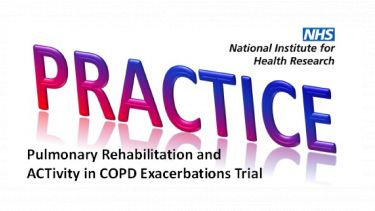PRACTICE research study
Pulmonary Rehabilitation and ACTIvity after COPD Exacerbations (PRACTICE)
Challenges
Chronic Obstructive Pulmonary Disease (COPD) affects over 3 million people in the UK and 210 million worldwide.
COPD is an ongoing lung condition that affects a person's ability to exercise and undertake normal activity due to breathlessness, poor physical fitness and muscle fatigue.
Patients with COPD often experience exacerbations due to chest infections, which result in worsening of their symptoms, more loss of function, and may require hospital treatment.
Recovery from exacerbations is often slow, and some patients never fully return to their previous level of activity. This can lead to permanent disability and premature death.
Pulmonary rehabilitation programmes have been shown to help with symptoms and recovery and is recommended but attendance at these programmes is low. Pulmonary rehabilitation delivered in hospital or immediately after discharge may help to maintain a person’s physical function.
This pilot trial looked at whether it might be possible to undertake a larger trial of exercise training in patients who have been admitted to hospital with Acute Exacerbation of Chronic Obstructive Pulmonary Disease (AECOPD).
The pilot aimed to find out whether patients were willing to participate and undertake exercise both during their time in hospital, and then immediately after they get home, to see if this will allow patients to recover more quickly, and get back to their previous level of activity.
Research
The study looked at two different sorts of exercise:
- a bedside bicycle based activity undertaken whilst the patient it sat at the edge of their bed in hospital (Hospital PR)
- a supervised exercise program undertaken during the first two weeks after they have been discharged (Home PR).
Both forms of exercise were be supervised by a physiotherapist (or physiotherapy assistant for the hospital exercise).
Participants were randomly assigned to receive:
- Hospital PR and Home PR
- Hospital PR but not Home PR
- Home PR but not Hospital PR
- neither Hospital PR nor Home PR
The additional exercises in the research will be given alongside usual care which is group pulmonary rehabilitation in the community.
The aim was to recruit 76 patients over seven months at two NHS hospitals.
The study looked at whether participants were prepared to undertake measurements of activity by means of a six minute walking distance test (6MWD) and by wearing an activity monitor at home.
They were also asked to complete several questionnaires that asked about their activities at home and how their breathing problems are affecting their quality of life. They were followed-up to three months after entering the trial.
Results
Over seven months 449 patients with COPD were screened for suitability in two NHS hospitals. The target recruitment was not met, with 58 participants entering the study.
Data was collected from 40 participants at the end of the study (at 90 days), and the primary clinical outcome (6MWD) was poorly completed, with 21 (36.2%) completed at 90 days.
The delivery of the in hospital exercises was difficult, with 34.1% sessions completed, mainly due to patient discharge. The delivery of the home exercise programme was quite good, with 78.1% of session going ahead.
Patients and physiotherapists mostly found the interventions acceptable, though there was difficulty in delivering the hospital intervention due to staff availability (in addition to patient discharge).
Participants reported feeling unwell but were generally able to do the exercises in the intervention.
As this is a pilot trial the numbers are too small to report any clinical differences between the groups.
Impact
Lessons were learnt to design a full scale trial that aims to assess the in home intervention as the in hospital intervention is too difficult to deliver.
Documents and publications
Participant information sheet (DOC, 309KB)
Publications in progress
- HTA monograph
- Trial paper
- Qualitative paper
- Optimisation paper
- Intervention development papers (for both interventions)
Study staff
| Name | Role | Site | Contact |
|---|---|---|---|
| Dr Rodney Hughes | Chief Investigator | Sheffield Teaching Hospitals NHS Foundation Trust | Rodney.Hughes@sth.nhs.uk |
| Matt Cox | Principal Investigator / Senior Physio | Sheffield Teaching Hospitals NHS Foundation Trust | Matthew.Cox@sth.nhs.uk |
| Cath O'Connor | Community Rehab Physio | Sheffield Teaching Hospitals NHS Foundation Trust | cath.o'connor@nhs.net |
| Dr Paul Albert | Principal Investigator | Aintree University Hospital NHS Foundation Trust | paul.albert@aintree.nhs.uk |
| Julie Channell | Pulmonary Rehab Physio | Aintree University Hospital NHS Foundation Trust | julie.channell@aintree.nhs.uk |
| Prof Stephen Walters | Senior Statistician | School of Health and Related Research, University of Sheffield | s.j.walters@sheffield.ac.uk |
| Prof Allan Wailoo | Health Economist | School of Health and Related Research, University of Sheffield | a.wailoo@sheffield.ac.uk |
| Dr John O'Reilly | Consultant Physician | Aintree University Hospital NHS Foundation Trust | john.oreilly@aintree.nhs.uk |
| Dr Daniel Hind | CTRU Assistant Director | Clinical Trials Research Unit, University of Sheffield | d.hind@sheffield.ac.uk |
| Katie Biggs | Trial Manager | Clinical Trials Research Unit, University of Sheffield | c.e.biggs@sheffield.ac.uk |

